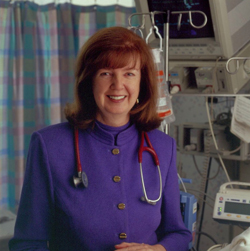 Health care providers must work collaboratively to keep patients with congenital heart defects connected to appropriate medical care as they move from childhood into adulthood.
Health care providers must work collaboratively to keep patients with congenital heart defects connected to appropriate medical care as they move from childhood into adulthood.
Thanks to advances in pediatric cardiology, children with congenital heart defects — including those with the most complex defects — are living longer.
“We will be observing for the first time the very long-term consequences of congenital heart disease,” said Roberta Williams, M.D., a pioneer in the field of echocardiography.
The same holds true for patients with other special health care needs, she said. In fact, in the next decade:
- 1 out of 10 young adults will have asthma;
- 1 out of 150 will have congenital heart disease;
- 1 out of 300 will have diabetes;
- 1 out of 450 will be a cancer survivor; and
- 500,000 children with special health care needs will turn 18.
Children with chronic health issues are beginning to hit adulthood in increasing numbers, said Dr. Williams, who gave Friday’s keynote address at the 11th annual Cardiovascular Research Symposium.
The health care system is not adequately prepared to transition childhood patients with congenital heart disease and other special health care needs into adult health care services. As a result, these “lost” populations are not receiving the necessary follow-up care, said Dr. Williams, professor and chairwoman of pediatrics at the University of Southern California Keck School of Medicine and the vice president of pediatrics and academic affairs at Children’s Hospital in Los Angeles.
A variety of factors affect the transition of children with chronic and congenital health issues to adult care, she said, including:
- The cognitive ability of the young adult;
- The progressive nature of the special health care needs or disability;
- Insurance funding;
- Availability of trained providers;
- Poor information transfer; and
- Decentralized care, which makes patients vulnerable if they have to change providers with each insurance change.
According to The Commonwealth Fund, young adults (19-29) represent 17 percent of the population and 30 percent of the uninsured under 65.
There also are social factors that keep survivors of chronic childhood diseases from the regular adult medical care they need, Dr. Williams said. Patients move away from their medical home, she said. They also encounter social and family transitions, remember the biological and social trauma associated with their condition and work to re-invent themselves.
“Patients talk about the social isolation they felt growing up with a chronic disease, so they act as though it never happened,” Dr. Williams said. “The denial can be extensive and health care is not something they necessarily will pursue.”
Strong partnerships between pediatric, internal medicine and allied health professionals can help patients with chronic diseases continue their health care as they move into adulthood, she said.